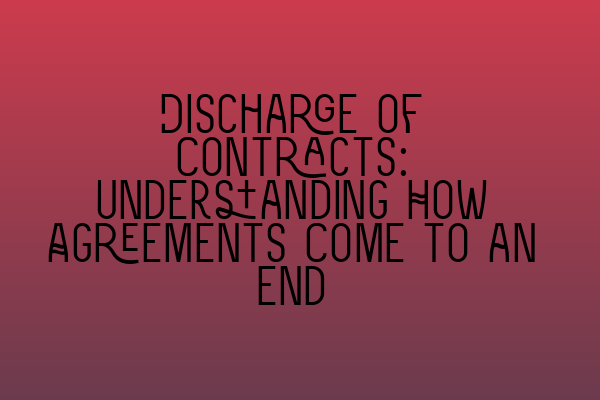Discharge of Contracts: Understanding How Agreements Come to an End
Contracts play a crucial role in commercial transactions and legal relationships. They create binding obligations between parties and provide a framework for conducting business. However, not all contracts last indefinitely. There are various ways in which agreements can come to an end, and understanding the concept of contract discharge is essential for any individual or business involved in contractual relationships.
What is Contract Discharge?
In contract law, discharge refers to the termination or release of a contract. It occurs when both parties have fulfilled their obligations under the agreement and are no longer bound by its terms. Discharge can also happen in situations where the contract becomes impossible to perform, or when one of the parties breaches the contract.
Methods of Contract Discharge
There are several methods by which a contract can be discharged:
1. Performance
The most common way a contract is discharged is through performance. This means that both parties fulfill their contractual obligations according to the agreed terms. When all requirements of the contract have been met, the obligations are considered fulfilled, and the contract is discharged. It is crucial to ensure that performance is properly documented to avoid any future disputes.
For example, if Party A agrees to sell a car to Party B for a specified price, and Party A delivers the car to Party B, and Party B pays the agreed price, then the contract is discharged through performance.
2. Agreement
The parties to a contract may mutually agree to terminate the agreement before performance is complete. This can happen through a formal termination agreement or a simple oral agreement between the parties. It is crucial to have clear communication and written evidence of the agreement to avoid any disputes about the termination later on.
For example, if Party A and Party B enter into a contract for Party A to provide consulting services to Party B for a specified period, but both parties agree to terminate the contract early due to changing circumstances, then the contract is discharged through agreement.
3. Frustration
Contracts can be discharged when unforeseen events occur, making it impossible to fulfill the obligations under the contract. This is known as frustration. Frustration occurs when an event beyond the control of the parties, and not due to their fault, fundamentally changes the nature of the contract, making it impossible to perform.
For example, if Party A contracts Party B to organize a music festival, but due to a natural disaster, the venue gets destroyed, making it impossible to hold the festival, then the contract is discharged due to frustration.
4. Breach
When one party fails to perform their obligations under the contract, it can result in a breach. A breach of contract occurs when a party fails to do what they promised to do under the agreed terms of the contract. This can lead to the other party being discharged from their obligations under the contract.
For example, if Party A contracts Party B to deliver a shipment of goods by a certain date, but Party B fails to do so, then Party A may be discharged from their obligation to pay for the goods.
Consequences of Contract Discharge
Once a contract is discharged, the parties are no longer bound by its terms. However, it is important to note that the discharge does not erase any existing rights or obligations that arose before the termination. Discharge simply means that the parties no longer have future obligations under the contract.
Conclusion
Understanding how contracts come to an end is vital for anyone involved in contractual relationships. Whether it’s through performance, agreement, frustration, or breach, the discharge of a contract signifies the end of the parties’ obligations under the agreement. By knowing the various methods of discharge, individuals and businesses can navigate contractual relationships with confidence and avoid potential disputes.
Related Articles:
